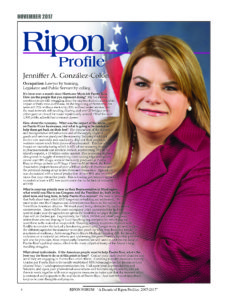…from the November 2017 edition:
 Name & Occupation: Jenniffer A. González-Colón; Lawyer by training, Legislator and Public Servant by calling.
Name & Occupation: Jenniffer A. González-Colón; Lawyer by training, Legislator and Public Servant by calling.
It’s been over a month since Hurricane Maria hit Puerto Rico. How are the people that you represent doing? My 3.4 million constituents are still struggling from the unprecedented catastrophic impact of both Irma and Maria. At the beginning of November, we were still 70% without electricity; 20% without water service; half the road network still needing clearing and over 20 bridges were either gone or closed for major repairs; only around 150 of the over 1,300 public schools had resumed classes. Most of the businesses that have reopened do so using generator power.
Although Puerto Ricans are working to overcome the crisis, and demonstrated ingenuity in adapting, you can only hold on so long. For many families, the needs of their elders and their sick for care, of schools for their children, to be able to get back to work and make a living, creates a pressure to relocate to other parts of the USA – tens of thousands already have.
How about the economy. What was the impact of the storm on Puerto Rican businesses, and what is going to be needed to help them get back on their feet? The destruction of the utilities and transportation infrastructure and of the supply chain of goods and services paralyzed the economy. Industry could not receive raw materials, run machinery, ship out their products; workers cannot reach their places of employment.
This has a huge impact in manufacturing which is 42% of our economy, mainly in pharmaceuticals and medical devices, representing 70% of the island’s exports, a 15-billion-dollar market. This is causing national disruptions in supply of everything from cutting edge biologicals, cancer and HIV drugs, some of them only produced in Puerto Rico, to things as basic as IV bags.
Closer to Main Street, the Retail Association projects losses of over a billion dollars in business and the potential closing of up to five thousand businesses. Agriculture was devastated with a loss of production of over 80% and recovery times that may extend for years. This is leading government agencies to project at least a 43% loss in revenues due to the lack of economic activity.
Besides getting power turned back on and the roads reopened so that activity can resume, the business sector will need access to short term assistance as well as long term measures. This includes access to the agriculture relief benefits available on the same footing as farms in the states. Small Businesses need expedited approval of emergency loans and in the longer term a package of measures to ease contracting and financing. Manufacturing requires a stable trade and tax policy outlook.
What is your top priority now as their Representative in Washington – what would you like to see Congress and the President do, both in the short term and long term, to help Puerto Rico recover? We need to ensure that both short term relief AND long-term rebuilding are addressed. We must make sure the Congress and Administration focus on the real needs of 3.4 million American citizens. We must avoid being distracted by media-driven controversies.
There will be more emergency relief appropriations and we need to make sure the agencies are given the flexibility to target the funds where they will do the best job.
Legislatively, for FEMA, FHWA and other programs where there are cost sharing or fund matching requirements for rebuilding we need these to be waived or suspended. Housing subsidy requirements need to be flexible to consider the lack of a functioning power grid. Longer term, we need to give the different agencies given the mandate to not just patch up what was there, but rebuild to standards of resiliency. Addressing Puerto Rico’s Medicaid funding cliff, the Island’s inclusion in in national tax reform, and addressing the government’s liquidity problem will also be priorities. Most importantly, however, we will need to address the issue of Puerto Rico’s political status, which is the main culprit of many of the Island’s long-standing struggles.
What about individuals. If the American people want to help Puerto Rico, what’s the best way for them to do so at this point in time? Contact your most trusted charities and see if they are engaging in Puerto Rico relief efforts. If wishing to make donations directly, Unidos por Puerto Rico is the locally established 503(c) clearinghouse for donations from citizens: http://unidosporpuertorico.com/en.
Call upon your Representatives and Senators, and upon your professional associations and business organizations, and ask them to get work together with me to supports measures to make sure that the recovery effort is sustained and responds to the real needs of Puerto Rico.
And last but most important, keep us in your thoughts and prayers.
Finally, a question about you. You rode out the hurricane in a closet, and are now leading the charge to help Puerto Rico rebuild. How are you holding up? It is exhausting, it’s truly a test. I already had one of the heaviest agendas in the House, having nearly five times as many constituents as the average member, with issues such as the debt crisis and Medicaid Cliff and the need for job creation legislation — and now we have this catastrophic event. I have been working basically 24/7 since day one, while my office has had to itself become a sort of relief mission coordinator for constituents in need. I pray daily to God that He grant’s me the strength and the tools to help my people.
I am blessed to count on a hard-working team and to have had life give me good allies and supporters to count upon. I believe that the challenges we face are put before us for a purpose, and have faith that this greater purpose will be achieved.




